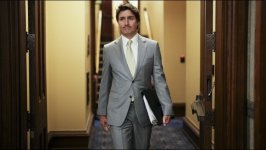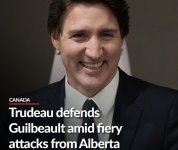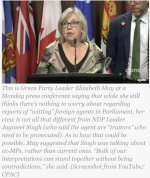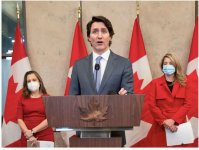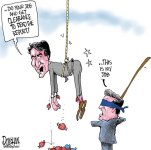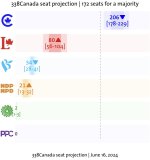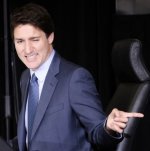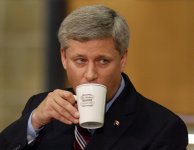Conservative Leader Pierre Poilievre has said he would eject any members of his caucus named in a bombshell NSICOP report warning of “witting” foreign agents in Parliament. As Poilievre said in a Wednesday radio interview, he would “absolutely” dismiss any Conservative MPs found to have “wittingly worked with a foreign government against Canada.”
The only problem is, he’s refusing to read the report.
The reason is a kind of legislative Catch-22 that Bloc Québécois Leader Yves-François Blanchet has previously referred to as a “dumb trap.” If Poilievre gets the top-level security clearance required to read the report, he will henceforth be sworn to secrecy on what it contains.
“Agreeing to this security briefing means getting the information and the names.
However…those who obtain the names are not allowed to disclose them, not allowed to talk about it and not allowed to act on this information,” was how Bloc Québécois MP Jean-Denis Garon explained the Catch-22 in the House of Commons this week.

 apple.news
Poilievre’s refusal to read the report also provided a rare moment of agreement between himself and former NDP leader Tom Mulcair.
apple.news
Poilievre’s refusal to read the report also provided a rare moment of agreement between himself and former NDP leader Tom Mulcair.
Speaking to CTV this week, Mulcair said he never would have taken a deal that would have required him to be “hamstrung” on what he could say in regards to a major foreign interference scandal.
“I don’t want to be told that now that I’ve seen this I can’t say that,” said Mulcair, who occupied Poilievre’s current position as Leader of the Official Opposition from 2012 to 2015.
The former NDP leader added, “I think that on this, Poilievre is completely right.”
To read the report — and to see the names of the accused foreign collaborators — parliamentarians have to quality for Top Secret security clearance.
Members of the NSICOP are what’s known as “persons permanently bound to secrecy,” meaning that they’re legally bound to take any state secrets to the grave. NSICOP clearance also goes a step further than typical top secret clearances in requiring parliamentarians to waive their usual rights to parliamentary immunity.
Under normal circumstances, comments made in the House of Commons are protected from any number of legal consequences. MPs, for instance, can say as many libellous things as they want without getting sued.
But the act governing the NSICOP makes clear that if a parliamentarian blabs any secrets during House of Commons proceedings, that comments are “admissible in evidence against them” in any subsequent national security prosecution.

 apple.news
If the NSICOP report contained a “list” of politicians who have helped foreign governments and who have benefited from foreign principals and their proxies to the detriment of Canada and Canadians, any serious observer of China’s whole-of-government exertions in this country since 2015 would full expect to see the prime minister’s name at the very top of it. Justin Trudeau has been a one-man Chinese influence operation for years, and he hasn’t even tried to hide it.
apple.news
If the NSICOP report contained a “list” of politicians who have helped foreign governments and who have benefited from foreign principals and their proxies to the detriment of Canada and Canadians, any serious observer of China’s whole-of-government exertions in this country since 2015 would full expect to see the prime minister’s name at the very top of it. Justin Trudeau has been a one-man Chinese influence operation for years, and he hasn’t even tried to hide it.
Nevermind his weird cash-for-access arrangements with multi-millionaire proxies of the Chinese government, the unaccountable serendipity of $67,080 in Mandarin-bloc donations replenishing the war chest of his own Papineau riding in Montreal in a single 48-hour period in July 2016, and other such indiscretions.
Open collaboration with Xi Jinping’s torture state was Trudeau’s policy when he ran for the Liberal leadership, and he embarked upon it with verve and style from his first days in the Prime Minister’s Office. It would be a “win-win” affair.
This is exactly why the prime minister is not, strictly speaking, a traitor. Treason by way of collaboration in foreign interference operations requires that the conduct be clandestine.
For nearly five years in the case of Han Dong, Trudeau pretended in public that there was nothing untoward about the Liberal nomination in Don Valley North, and that it was racist to suggest that there was, and that there was nothing amiss about busloads of Chinese students showing up from a posh foreign-student academy in another riding to cast votes for Dong.
All along, Trudeau knew that CSIS had assessed that the students were strong-armed by the Chinese consulate, that they were from another riding and therefore voting in contravention of the Liberal Party’s rules, that they used fraudulent party credentials and that they had intimidated local Liberal party members to get Beijing’s guy on the ticket.

 www.youtube.com
www.youtube.com
The only problem is, he’s refusing to read the report.
The reason is a kind of legislative Catch-22 that Bloc Québécois Leader Yves-François Blanchet has previously referred to as a “dumb trap.” If Poilievre gets the top-level security clearance required to read the report, he will henceforth be sworn to secrecy on what it contains.
“Agreeing to this security briefing means getting the information and the names.
However…those who obtain the names are not allowed to disclose them, not allowed to talk about it and not allowed to act on this information,” was how Bloc Québécois MP Jean-Denis Garon explained the Catch-22 in the House of Commons this week.
FIRST READING: Why Poilievre is refusing to read the 'traitors' report — National Post
To read it, he would need to become a 'person permanently bound to secrecy'
Speaking to CTV this week, Mulcair said he never would have taken a deal that would have required him to be “hamstrung” on what he could say in regards to a major foreign interference scandal.
“I don’t want to be told that now that I’ve seen this I can’t say that,” said Mulcair, who occupied Poilievre’s current position as Leader of the Official Opposition from 2012 to 2015.
The former NDP leader added, “I think that on this, Poilievre is completely right.”
To read the report — and to see the names of the accused foreign collaborators — parliamentarians have to quality for Top Secret security clearance.
Members of the NSICOP are what’s known as “persons permanently bound to secrecy,” meaning that they’re legally bound to take any state secrets to the grave. NSICOP clearance also goes a step further than typical top secret clearances in requiring parliamentarians to waive their usual rights to parliamentary immunity.
Under normal circumstances, comments made in the House of Commons are protected from any number of legal consequences. MPs, for instance, can say as many libellous things as they want without getting sued.
But the act governing the NSICOP makes clear that if a parliamentarian blabs any secrets during House of Commons proceedings, that comments are “admissible in evidence against them” in any subsequent national security prosecution.
Terry Glavin: Trudeau's Chinese collaboration has been in broad daylight all along — National Post
It's been his policy since he ran for the Liberal leadership
Nevermind his weird cash-for-access arrangements with multi-millionaire proxies of the Chinese government, the unaccountable serendipity of $67,080 in Mandarin-bloc donations replenishing the war chest of his own Papineau riding in Montreal in a single 48-hour period in July 2016, and other such indiscretions.
Open collaboration with Xi Jinping’s torture state was Trudeau’s policy when he ran for the Liberal leadership, and he embarked upon it with verve and style from his first days in the Prime Minister’s Office. It would be a “win-win” affair.
This is exactly why the prime minister is not, strictly speaking, a traitor. Treason by way of collaboration in foreign interference operations requires that the conduct be clandestine.
For nearly five years in the case of Han Dong, Trudeau pretended in public that there was nothing untoward about the Liberal nomination in Don Valley North, and that it was racist to suggest that there was, and that there was nothing amiss about busloads of Chinese students showing up from a posh foreign-student academy in another riding to cast votes for Dong.
All along, Trudeau knew that CSIS had assessed that the students were strong-armed by the Chinese consulate, that they were from another riding and therefore voting in contravention of the Liberal Party’s rules, that they used fraudulent party credentials and that they had intimidated local Liberal party members to get Beijing’s guy on the ticket.

Here's why Pierre Poilievre isn't reading the foreign interference report.
The Trudeau Liberals love raising the issue of Pierre Poilievre's security clearance and why he won't read the report. Here's what is really going on.
